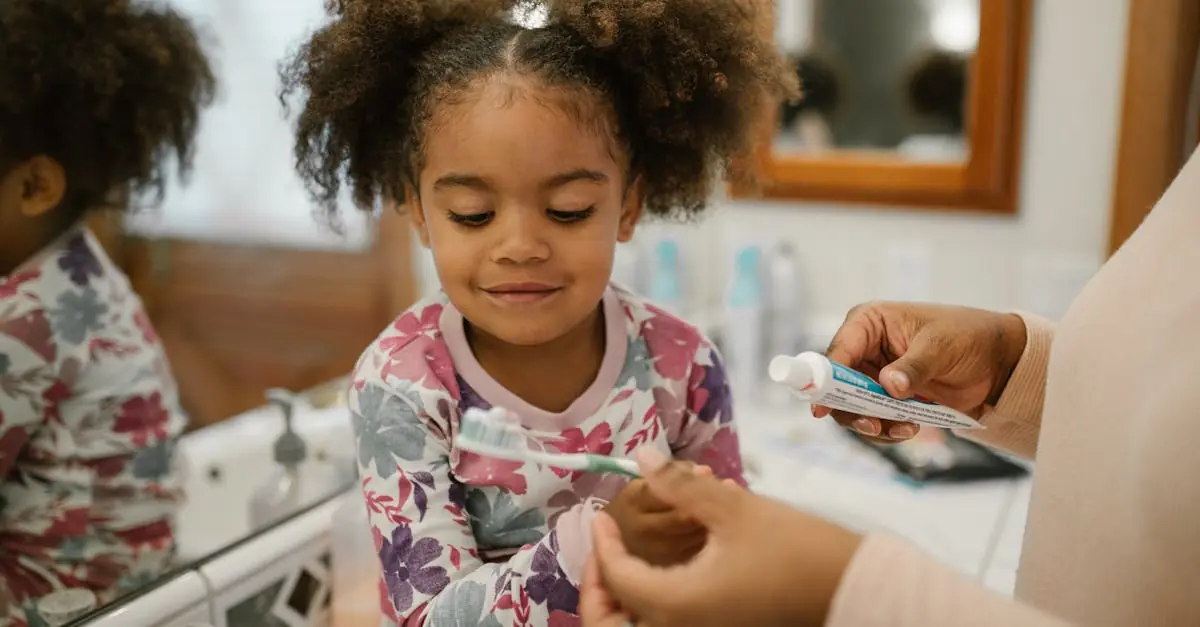Parenting can feel like juggling flaming swords while riding a unicycle. It’s a chaotic adventure filled with sleepless nights and endless questions like, “Why is that in the toaster?” But amidst the madness, happy parenting is not just a dream—it’s a reality waiting to be embraced.
Table of Contents
ToggleUnderstanding Happy Parenting
Happy parenting involves creating joyful, nurturing relationships with children. Achieving a balance between discipline and affection is essential for fostering a positive family dynamic.
Definition of Happy Parenting
Happy parenting refers to the approach that promotes emotional connection and satisfaction within family life. Emphasis lies on support, love, and understanding between parents and children. This parenting style prioritizes the well-being of each family member while encouraging individual growth. Happy parents engage in their children’s lives through active involvement, communication, and shared experiences. They celebrate achievements and navigate challenges together. This method cultivates resilience and emotional intelligence in children, contributing to their overall happiness.
Importance of Nurturing a Positive Environment
Nurturing a positive environment significantly impacts children’s development. A supportive atmosphere encourages open communication and trust between family members. Such an environment helps children feel secure and valued, which leads to improved self-esteem. Parents who model positivity promote emotional regulation in their children, teaching them coping skills for life’s challenges. Inclusivity and appreciation of diversity in family interactions further enrich children’s understanding of the world. Happiness thrives in homes where laughter and affection abound, laying a foundation for lifelong well-being.
Key Principles of Happy Parenting
Happy parenting thrives on specific principles that foster joy and connection within families. Two essential principles include communication and connection, as well as encouraging independence.
Communication and Connection
Clear communication strengthens relationships between parents and children. It builds trust and encourages open dialogue, allowing children to express their feelings and thoughts. Parents who listen actively reinforce this trust and validate their children’s experiences. Sharing experiences, whether through stories or daily activities, creates lasting bonds. Engaging in conversations about interests, dreams, or worries enables deeper connections. Frequent check-ins also support emotional well-being. Parents establish a nurturing atmosphere where children feel understood and valued, essential for their healthy development.
Encouraging Independence
Fostering independence helps children develop confidence and self-reliance. Allowing children to make choices, from simple decisions to more complex ones, promotes critical thinking. Parents who set age-appropriate boundaries empower their children to explore their abilities. Encouragement fuels children’s desire to try new things and learn from mistakes. Celebrating small successes reinforces their sense of achievement. Providing opportunities for age-appropriate responsibilities, like chores or tasks, cultivates a sense of ownership. This support allows children to grow into capable individuals, ready to face life’s challenges with resilience.
Strategies for Implementing Happy Parenting
Happy parenting involves applying effective strategies that promote positive family dynamics and emotional growth. The following techniques enhance relationships and nurture children’s development.
Positive Reinforcement Techniques
Positive reinforcement encourages desirable behaviors in children. Offering praise or rewards for accomplishments bolsters self-esteem and motivation. For instance, acknowledging a child’s effort in completing homework fosters a love of learning. Using specific feedback, such as “I appreciate how you shared your toys,” deepens the impact. Celebrating small achievements cultivates a sense of accomplishment, making children more likely to repeat those behaviors. Engaging in a system of rewards, like stickers or extra playtime, creates a fun atmosphere where children feel recognized and valued. By consistently applying these techniques, parents nurture an environment that promotes confidence and resilience.
Balancing Discipline with Love
Balancing discipline and love encourages children to learn from mistakes while feeling secure. Establishing clear expectations sets the groundwork for behavior. For example, implementing natural consequences helps children understand the impact of their actions. Parents must communicate consequences with empathy, reinforcing that discipline comes from a place of love, not anger. Using a calm tone during discussions about behavior allows children to absorb lessons without feeling attacked. Fostering an environment where children can express their feelings further strengthens this balance. Celebrating successes while addressing unacceptable behavior maintains a nurturing relationship, reinforcing trust and open communication. This approach cultivates emotional intelligence, helping children navigate social relations effectively.
Overcoming Challenges in Happy Parenting
Happy parenting involves navigating various challenges while maintaining joy and connection with children. Stress and burnout can arise from the daily demands of parenting, making it crucial for parents to find effective ways to cope and thrive.
Managing Stress and Burnout
Managing stress contributes significantly to maintaining a joyful parenting experience. Parents can practice mindfulness techniques, which help in staying present during chaotic moments. Regular exercise boosts mood and energy levels, offering a natural way to alleviate stress. Setting aside time for personal interests fosters a sense of individuality and satisfaction outside of parenting roles. Creating a consistent daily routine reduces uncertainty, allowing parents to better manage expectations. Additionally, prioritizing self-care fuels resilience, enabling parents to approach challenges with patience and understanding.
Seeking Support from the Community
Seeking support strengthens the journey of happy parenting. Engaging with local parenting groups allows for sharing experiences and advice with other caregivers. Forming friendships with fellow parents provides emotional support during difficult times. Encouraging spouses or partners to participate fosters a united front in addressing challenges. Utilizing available resources, such as workshops or courses, enhances parenting skills and promotes new strategies. By connecting with the community, parents build a network that creates a collaborative environment, enriching their parenting experience and reducing feelings of isolation.
Happy parenting isn’t just about navigating challenges; it’s about creating a nurturing environment where joy and connection flourish. By prioritizing communication and emotional support, parents can build strong relationships with their children that promote resilience and self-esteem.
Implementing positive reinforcement and balancing discipline with love fosters a sense of security and understanding. This approach not only helps children learn from their mistakes but also encourages them to embrace independence.
As parents embrace their journey with mindfulness and community support, they pave the way for a fulfilling family life. Ultimately, happiness in parenting thrives when homes are filled with laughter, love, and shared experiences, laying the groundwork for lifelong well-being.






